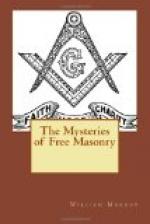Q. A brother receiving a pledge and granting a favor, whom does he represent? A. King Solomon, who was a rich man, but renowned for his benevolence.
* * * * *
THE PAST MASTER’S DEGREE.
This degree is very simple. It is necessary that a Master Mason should take this degree before he can, constitutionally, preside over a Lodge of Master Masons as Master of it; and when a Master Mason is elected Master of a Lodge, who has not previously received the Past Master’s degree, it is then conferred upon him, often without any other ceremony than that of administering the obligation.
This Lodge is opened and closed in the same manner that the Lodges of the first three degrees are; the candidate petitions and is balloted for in the same manner, but he is received into the Lodge in a very different manner. He is conducted into the Lodge without any previous preparation, when the presiding officer rises and says, “Brethren, it is inconvenient for me to serve you any longer as Master of this Lodge. I wish you would select some other brother for that purpose.” The candidate is nominated, the usual forms of balloting for officers are then dispensed with, and a vote of the Lodge is taken by yeas and nays. The candidate is elected, and generally refuses to serve, but he is eventually prevailed on to accept; whereupon the presiding officer addresses the Master-elect in the words following, viz.:
“Brother, previous to your investiture,
it is necessary that you
assent to those ancient charges and regulations,
which point out
the duty of a Master of a Lodge.
1. You agree to be a good man and
true, and strictly to obey the
moral law.
2. You agree to be a peaceable subject,
and cheerfully to conform
to the laws of the country in which you
reside.
3. You promise not to be concerned
in any plots or conspiracies
against government; but patiently to submit
to the decisions of
the supreme legislature.
4. You agree to pay a proper respect
to the civil magistrate, to
work diligently, live creditably, and
act honorably by all men.
5. You agree to hold in veneration the original rules and patrons of Masonry, and their regular successors, supreme and subordinate, according to their stations, and to submit to the awards and resolutions of your brethren when convened, in every case consistent with the constitution of the Order.
6. You agree to avoid private piques
and quarrels, and to guard
against intemperance and excess.
7. You agree to be cautious in carriage
and behavior, cautious to
your brethren, and faithful to your Lodge.
8. You promise to respect genuine
brethren and discountenance
impostors, and all dissenters from the
original plan of Masonry.




